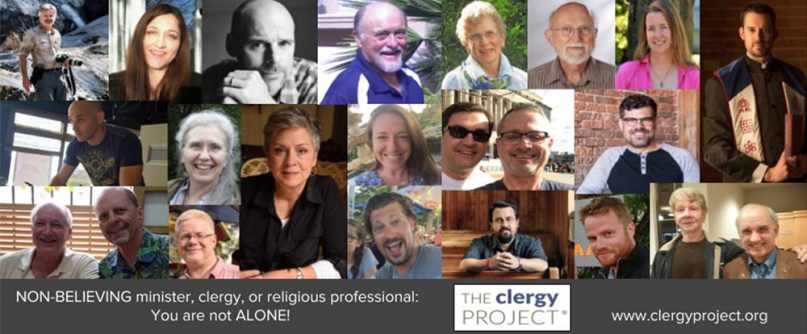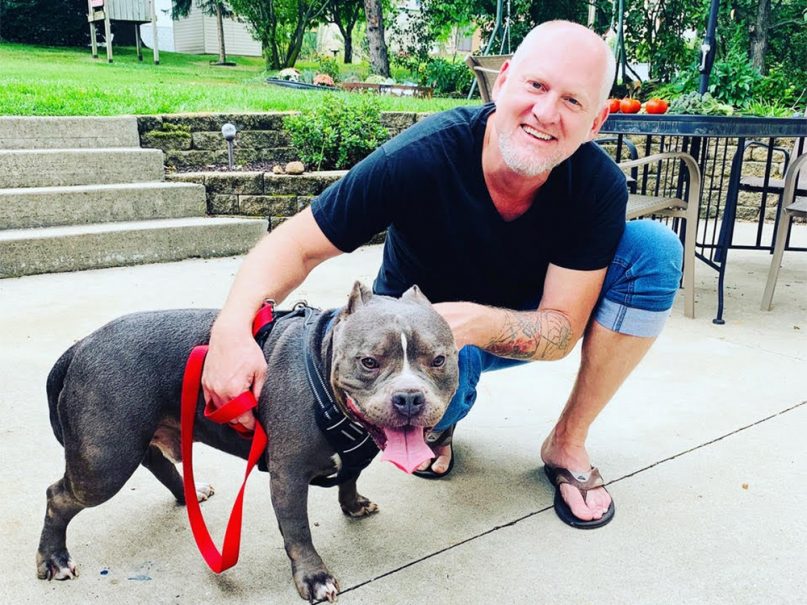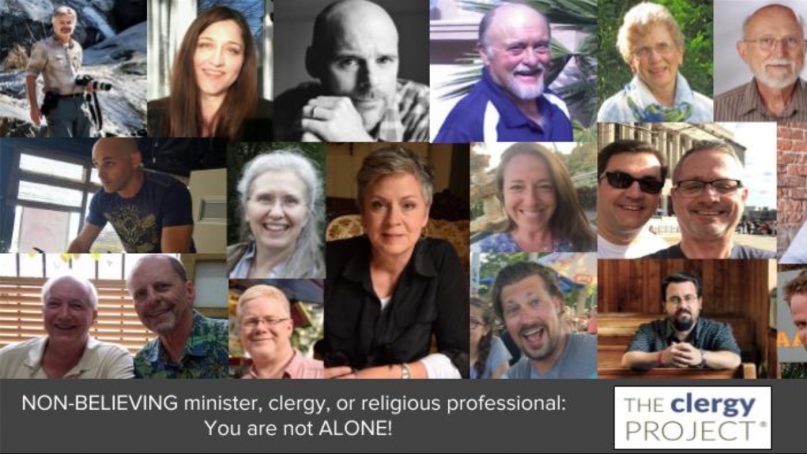
Image courtesy of the Clergy Project
(RNS) — Luke Emrich delivered his last sermon in January 2018, but six months later, the Wisconsin pastor was still struggling to move beyond the evangelical world that had shaped him and provided him a living for his entire adult life.
Then he heard a podcast with Drew Bekius, a former president of The Clergy Project. On a walk with his wife and dog, Emrich shared what he had heard.
“She said, ‘You need to talk to someone. You need some support. Why don’t you reach out to him?’” Emrich recalled.
Emrich, 49, credits Bekius and the larger organization, whose mission is to build an online community for “post-belief religious leaders,” with providing him with support and encouragement to make a new life in the secular world.
“It was the first time I realized I was not an anomaly,” said Emrich of his experience meeting participants of The Clergy Project.”I was not alone. I could talk to peers. Even more so, I could talk to a variety of peers in different faith traditions, which was wonderful. I could get their insights.”

Luke Emrich and his dog, Bae. Emrich pastored evangelical churches until January 2018. Courtesy photo
The Clergy Project, which expects to draw its 1,000th participant sometime in the next month, was founded in 2011 with seed money from the Richard Dawkins Foundation, the charitable arm set up by the British evolutionary biologist and ardent atheist.
Besides providing a private online forum and Facebook group where clergy and former clergy can share stories and struggles with coming out as nonbelievers, the project offers practical services: a grant to help new participants assess their job skills and polish their resumes, and up to 12 private sessions with a licensed counselor for those needing mental health support.
Though The Clergy Project includes active and former clergy from 49 countries, the majority of the group’s 994 participants are from the U.S. and Canada. They include ministers, priests, rabbis and imams.
They all share one thing: a rejection of belief in the supernatural, which is the only criteria for joining.
Making that declaration and publicly “coming out” isn’t easy.
“If I’m a plumber and I’ve decided I’ve had enough, nobody cares,” said Lon Ostrander, president of the Clergy Project and a onetime Wesleyan church pastor. “If I’m priest or pastor or rabbi or imam and I don’t believe it anymore and I want to get out, I’m in a tight spot. People quite often have to move to another town, buy a home. Sometimes they end up divorced and not seeing their kids.”
Though the number of atheists in the U.S. is a matter of debate, there are now more atheists in the U.S. than Jews and Muslims combined.
A recent Gallup poll found that 10% of Americans do not believe in God. A novel 2017 University of Kentucky study found as many as 26% who do not believe in God. But, according to Pew Research, only about 3% identify as “atheist” and another 4% as “agnostic.” (About 2% of Americans are Jewish, and just over 1% are Muslim.)
Whatever the number of atheists, the success of The Clergy Project indicates that it is meeting a need.
“It’s not a project that fizzled and died,” said Ryan Cragun, professor of sociology at the University of Tampa who studies atheists. “This is a project that has legs and is continuing to grow, and more and more people are signing up to say, ‘How can I repurpose my life? I need to do something different.’”
To be sure, clergy in more liberal faith traditions have an easier time. Take the Rev. Gretta Vosper, an ordained minister of the United Church of Canada who is a self-professed atheist. Last year, the Toronto region of the denomination, Canada’s largest Protestant group, ruled that Vosper could keep her job.
READ: Atheist minister Gretta Vosper hopes to stay at Canadian church for the long haul
In the U.S., many liberal Christian and Jewish clergy are upfront about their doubts, even if they don’t proclaim themselves atheists. And their congregants are OK with that.
“They can stay there and not be believers,” Cragun said. “Their congregants struggle with it too. They don’t have to leave. It’s still a safe place for them.”
Part of it may be a growing acceptance of atheism. For decades, atheism was associated with communism, as in “godless communist.” With the end of the Cold War, it’s easier to admit nonbelief — even atheism — than at any time in the past century, or maybe ever.
But for Emrich, who left a 300-member nondenominational church in a small town north of Milwaukee, The Clergy Project offered a community to replace the one he left. He had been drifting away from the doctrines of the conservative Christian world he had grown up in, but despite having the support of his wife and four children as his views evolved, it took him three years to hatch an exit plan.
Then in 2017, he told his church he was leaving and took a job as a project manager with a decorating company.
“It was sobering, chilling, scary and at the same time, very freeing,” Emrich said.
These days, Emrich likes to call himself simply a humanist.





